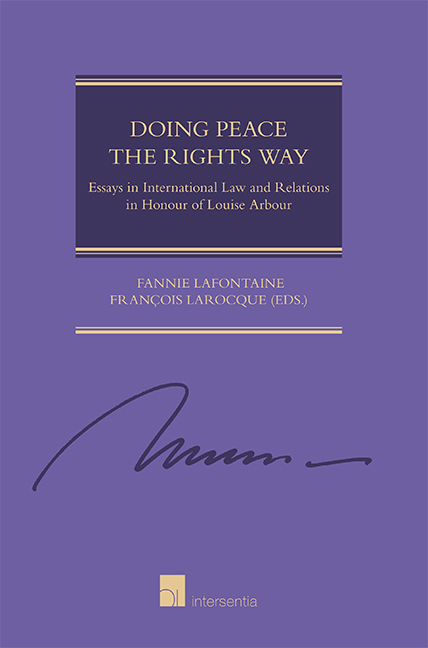Book contents
- Frontmatter
- Foreword
- Contents
- List of Contributors
- Introduction
- PART I OF FREEDOM AND EQUALITY
- Human Rights Obligations for Non-State Actors: Where Are We Now?
- The Right to Truth: When Does it Begin?
- Corruption, Inequality and Boko Haram in Nigeria
- Social and Economic Rights and the Legal Imagination
- Building a Culture of Inclusivity in a Diverse Society
- Made in Canada: A Failed War on Drugs
- Unaccompanied Children Out of Their Country of Origin: Trapped in the Administrative Net
- PART II OF PEACE AND JUSTICE
- PART III OF WOMEN AND LEADERSHIP
- An Interview with the Honourable Madam Justice Louise Arbour
Building a Culture of Inclusivity in a Diverse Society
from PART I - OF FREEDOM AND EQUALITY
Published online by Cambridge University Press: 13 April 2019
- Frontmatter
- Foreword
- Contents
- List of Contributors
- Introduction
- PART I OF FREEDOM AND EQUALITY
- Human Rights Obligations for Non-State Actors: Where Are We Now?
- The Right to Truth: When Does it Begin?
- Corruption, Inequality and Boko Haram in Nigeria
- Social and Economic Rights and the Legal Imagination
- Building a Culture of Inclusivity in a Diverse Society
- Made in Canada: A Failed War on Drugs
- Unaccompanied Children Out of Their Country of Origin: Trapped in the Administrative Net
- PART II OF PEACE AND JUSTICE
- PART III OF WOMEN AND LEADERSHIP
- An Interview with the Honourable Madam Justice Louise Arbour
Summary
INTRODUCTION
The world is currently experiencing a regression in the protection of human rights (including international humanitarian law). Non-state actors and states, including those who once led the charge in developing an international legal order based, in part, on the protection of human rights, frequently violate or condone their violation. The trivialization of these violations in the name of security imperatives, sectarian religious ideologies and unbridled economic development must motivate us to redouble our efforts in the defence of fundamental rights. More than ever, it is important to remember that peace and security, respect for human rights, democratic governance and economic development are all inextricably linked. Consequently, national policies must be based on respect for human rights and be inclusive so that all segments of society feel equally protected by the state. In this contribution, I will first delve into how human rights, democracy, international peace and security are intertwined in all respects. I will then turn to the need for national efforts aimed at fostering a greater respect of human rights, emphasizing in this regard the role civil society has played in my country, Pakistan, for several decades.
HUMAN RIGHTS, DEMOCRACY, PEACE AND SECURITY IN A TROUBLED WORLD
Human rights are not an exclusively municipal or national concern; quite the contrary. Human rights are universal, indivisible and have a direct impact on international peace and security.
HUMAN RIGHTS VIOLATIONS AS THREATS TO PEACE AND SECURITY
Contemporary threats to peace and security extend far beyond wars between states. Peace can no longer be equated with the absence of war – so-called negative peace. The peace we should strive for – positive peace – must be based on the cooperation between groups or nations and the elimination of the root causes of conflicts. This approach is embodied in the now well-established mechanisms of peace-building, which aim to prevent the resumption of hostilities by defining and supporting structures to strengthen peace. The internal governance of states is therefore an essential element of peace.
Unfortunately, these days, many communities are besieged by violence in the name of religion, ethnicity and the rejection of diverse identities.
- Type
- Chapter
- Information
- Doing Peace the Rights WayEssays in International Law and Relations in Honour of Louise Arbour, pp. 85 - 102Publisher: IntersentiaPrint publication year: 2019



